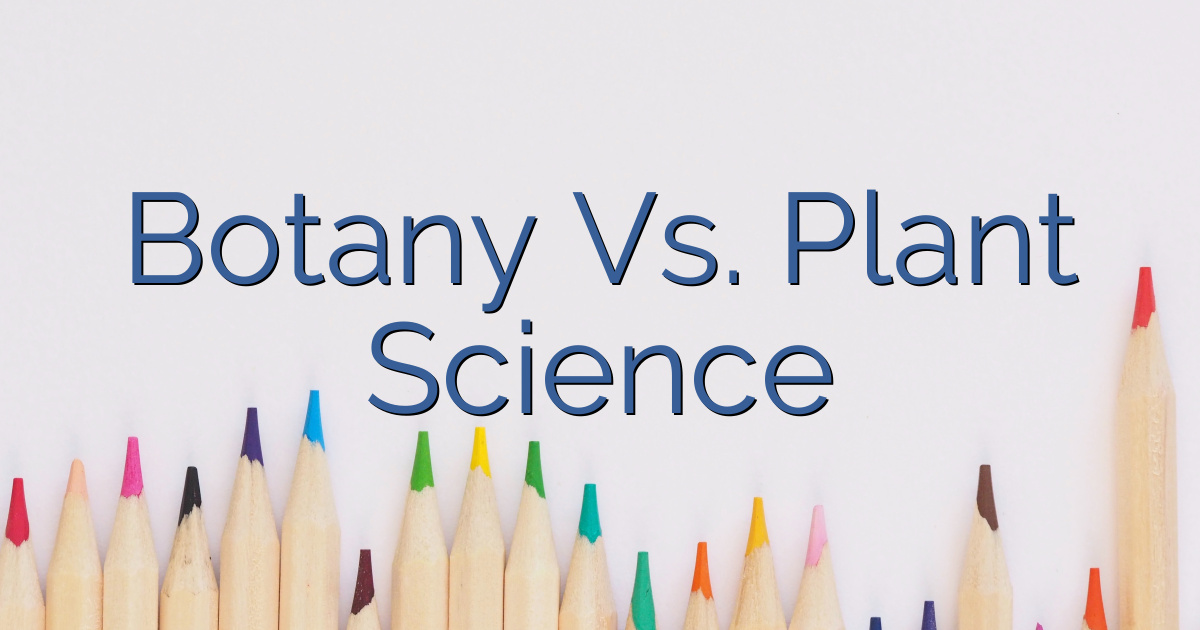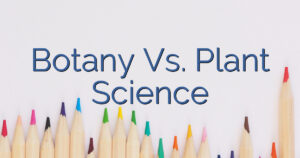
Are you torn between pursuing a degree in botany or plant science? Look no further, as this article dives into the intricacies of these two majors.
Delve into the curriculum, research opportunities, and assessments of both fields. Discover the skills developed and the career opportunities awaiting you in either path.
Uncover the salary potential and explore the similarities and differences between botany and plant science. Let us guide you in making an informed decision based on your interests and aspirations.
Table of Contents
Key Takeaways
- Botany and plant science are broad fields that encompass the study of plants and their interactions with the environment.
- Both majors offer a robust curriculum and research opportunities, covering foundational topics like plant anatomy, physiology, genetics, and ecology.
- Skills developed in botany and plant science careers include plant identification and classification, plant physiology and biochemistry, and plant ecology and conservation.
- Career opportunities in botany include plant taxonomist, plant ecologist, and plant physiologist, while plant science offers job roles such as plant breeder, plant pathologist, and horticulturist.
Overview of the two majors in plant science
If you’re trying to decide between botany and plant science, let’s give you an overview of these two majors.
Plant science is a broad field that encompasses the study of plants and their interactions with the environment. Within plant science, there are various specializations that you can choose from, such as plant physiology, plant pathology, plant genetics, and plant ecology. These specializations allow you to delve deeper into specific aspects of plant biology and develop expertise in those areas.
Fieldwork plays a crucial role in plant science studies. It involves conducting research and experiments directly in the natural environment, such as forests, grasslands, and wetlands. Fieldwork allows you to observe plants in their natural habitats, collect samples, and study their interactions with other organisms. It provides valuable insights into plant behavior, adaptation, and response to environmental changes. Additionally, fieldwork helps develop practical skills in plant identification, data collection, and analysis.
Overview of the curriculum and research opportunities in the two majors
The curriculum and research opportunities in the two majors provide students with valuable knowledge and hands-on experience. Here is an overview of what you can expect in terms of coursework, internships, research opportunities, and faculty mentors:
- Coursework: Both majors offer a comprehensive curriculum that covers foundational topics such as plant anatomy, physiology, genetics, and ecology. You will also have the opportunity to delve into specialized areas like plant pathology, plant breeding, and plant biotechnology.
- Internships: Both majors emphasize the importance of practical experience. You will have the opportunity to participate in internships with industry partners, research institutions, or government agencies. These internships provide a valuable opportunity to apply your knowledge in real-world settings and gain practical skills.
- Research opportunities: Both majors provide numerous research opportunities. You can work with faculty mentors on cutting-edge research projects, conduct independent research, or participate in collaborative research initiatives. These research experiences allow you to develop critical thinking skills, contribute to scientific knowledge, and potentially publish your findings.
Overall, both majors offer a robust curriculum and ample research opportunities to prepare you for a successful career in the field of botany or plant science.
Overview of coursework, assessments, and research opportunities
Both majors’ coursework, assessments, and research opportunities equip students with valuable knowledge and hands-on experience in the field.
In both botany and plant science, students have the flexibility to choose from a range of coursework that suits their interests and career goals. They can explore topics such as plant physiology, genetics, ecology, and taxonomy. The coursework is designed to provide a strong foundation in plant biology, with an emphasis on understanding the structure and function of plants at the cellular, molecular, and whole-organism levels.
Additionally, both majors offer research projects that allow students to engage in cutting-edge scientific inquiry. These projects may involve fieldwork, laboratory experiments, data analysis, and scientific writing. Through these research experiences, students develop critical thinking skills, learn to conduct independent research, and contribute to the advancement of knowledge in the field of plant sciences.
Comparison of Skills Developed in Botany and Plant Science Careers
Students in botany and plant science majors develop a wide range of skills that can be applied to various careers in the field. These skills are essential for understanding and researching plant life, as well as for contributing to the conservation and sustainable management of our natural resources.
Here are some key skills developed in botany and plant science careers:
- Plant identification and classification:
- Taxonomy and systematics
- Morphology and anatomy
- Plant physiology and biochemistry:
- Photosynthesis and respiration
- Plant metabolism and growth
- Plant ecology and conservation:
- Understanding ecosystems and their dynamics
- Conservation strategies and practices
- Research and data analysis:
- Experimental design and data collection
- Statistical analysis and interpretation
Both botany and plant science majors share these core skills, but the main difference lies in their focus. Botany tends to have a more traditional emphasis on plant taxonomy and systematics, while plant science encompasses a broader range of disciplines, including physiology, ecology, and biochemistry.
Regardless, both majors provide students with a strong foundation to pursue rewarding careers in the field of plant science.
Comparison of Career Opportunities and Job Roles in Botany and Plant Science Fields
Career opportunities and job roles in botany and plant science fields vary depending on individual interests and areas of specialization. Both fields offer promising career growth and have a high industry demand. Here is a comparison of the career opportunities and job roles in botany and plant science:
| Botany | Plant Science |
|---|---|
| Plant Taxonomist | Plant Breeder |
| Plant Ecologist | Plant Pathologist |
| Plant Physiologist | Horticulturist |
In botany, you can work as a plant taxonomist, studying the classification and identification of plants. Plant ecologists focus on understanding the relationships between plants and their environment. Plant physiologists study plant functions and processes. On the other hand, in plant science, you can work as a plant breeder, developing new plant varieties for improved traits. Plant pathologists study plant diseases and develop strategies to control them. Horticulturists specialize in the cultivation and management of plants for ornamental, medicinal, or food purposes.
With the increasing need for sustainable agriculture and environmental conservation, both botany and plant science offer rewarding career paths with ample opportunities for growth.
Comparison of Salary Potential in Botany and Plant Science Fields
If you’re interested in salary potential, it’s important to compare the earnings in the fields of botany and plant science. While both fields involve the study of plants, there are differences in terms of job prospects and potential income.
Here are some key points to consider:
- Botany:
- Research-oriented: Botanists often work in research institutions, universities, or government agencies, conducting studies on plant life and its applications.
- Salary potential: On average, botanists earn around $68,950 per year, according to the Bureau of Labor Statistics. However, those with advanced degrees or specialized expertise can earn higher salaries.
- Plant Science:
- Industry-focused: Plant scientists are more likely to work in industries such as agriculture, biotechnology, or pharmaceuticals, where they contribute to the development of new plant-based products.
- Salary potential: Plant scientists have a slightly higher salary potential, with an average annual income of $74,770. This is due to the demand for their expertise in industries that heavily rely on plants.
Similarities between botany and plant science majors
When considering majors in the field of plant study, you’ll find that botany and plant science have many similarities. Both disciplines focus on the scientific study of plants, including their classification, growth, reproduction, and interaction with the environment. They share a common goal of understanding the complexity of plant life and its significance in the natural world.
Both botany and plant science require a strong foundation in biology, chemistry, and ecology, as well as hands-on laboratory and fieldwork experience. Additionally, botany and plant science majors often pursue careers in research, conservation, agriculture, or education.
However, there are some differences between the two. Botany tends to have a more traditional focus on the classification and taxonomy of plants, while plant science incorporates more interdisciplinary approaches, including genetics, biotechnology, and environmental sustainability.
Despite these differences, both majors offer exciting opportunities for those passionate about the study of plants.
Difference between botany and plant science majors
One way the two majors differ is in their focus on the classification and taxonomy of plants versus more interdisciplinary approaches. Here are four key differences between botany and plant science majors:
- Coursework: Botany majors typically take courses that delve deep into plant taxonomy, morphology, and anatomy. On the other hand, plant science majors have a broader curriculum that includes courses in genetics, biotechnology, ecology, and plant physiology.
- Research Opportunities: Botany majors often have more opportunities to engage in fieldwork and conduct research specifically focused on plant classification and taxonomy. Plant science majors, however, have the advantage of exploring interdisciplinary research areas, such as plant genetics, molecular biology, and crop improvement.
- Job Prospects: Both majors offer promising job prospects in various sectors, including agriculture, environmental consulting, pharmaceuticals, and botanical gardens. However, plant science majors may have an edge when it comes to job opportunities in biotechnology and genetic engineering.
- Interdisciplinary Approach: Plant science majors have the advantage of gaining knowledge in diverse fields, enabling them to tackle complex issues related to plant health, sustainability, and food security. Botany majors, on the other hand, focus more on the fundamental aspects of plant classification and taxonomy.
Overall, while botany and plant science share some similarities, their differences in coursework and research opportunities provide students with unique paths and job prospects in the field of plant sciences.
Factors to consider when choosing between the two majors: interests
When choosing between the two majors, it’s important to consider your interests and what aspects of plant studies you find most compelling. Both botany and plant science offer exciting opportunities for career growth and exploration, but understanding the factors that differentiate them can help you make an informed decision. One crucial aspect to consider is the career prospects and job market demand for each major.
| Factors to Consider | Botany Major | Plant Science Major |
|---|---|---|
| Career Prospects | Research scientist, environmental consultant, plant breeder | Agronomist, horticulturalist, plant geneticist |
| Job Market Demand | Growing demand for environmental scientists | Increasing need for sustainable agriculture experts |
Both majors have promising career prospects, but the specific job opportunities may vary. Botany majors can pursue research-related roles, such as becoming a research scientist or an environmental consultant. On the other hand, plant science majors can explore careers as agronomists, horticulturalists, or plant geneticists. It’s essential to consider the current job market demand as well. The demand for environmental scientists is growing steadily, offering numerous opportunities for botany majors. Similarly, the need for sustainable agriculture experts is increasing, providing ample job prospects for plant science majors. By considering your interests and the career prospects and job market demand, you can make an informed decision about which major aligns best with your goals and aspirations.
Conclusion
Congratulations on reaching the end of this informative journey comparing botany and plant science!
You have delved into the intricate world of plants, exploring the curriculum, research opportunities, and career prospects in both majors.
As you stand at the crossroads, pondering which path to choose, remember that your decision will shape your future. Like a delicate seed, your choice will determine the direction in which you will grow and bloom.
So, listen to the whispers of your heart, follow your passion, and let the enchanting world of plants guide you towards a fulfilling and prosperous career.

